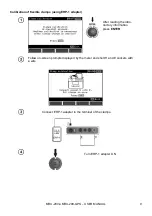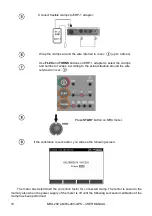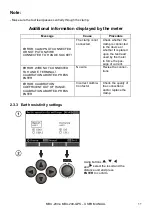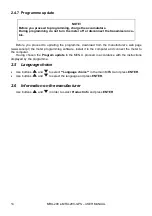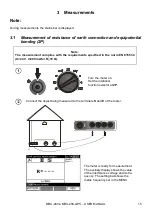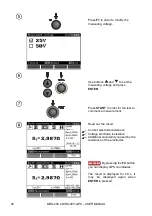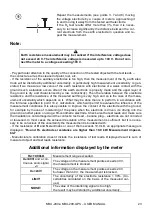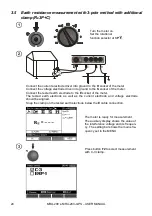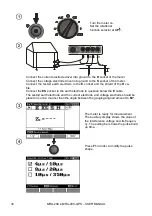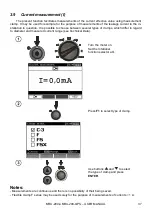
MRU-200
● MRU-200-GPS – USER MANUAL
23
S
Repeat the measurements (see points 3, 7 and 8) moving
the voltage electrode by a couple of meters: approaching it
to and moving it away from the tested earth electrode.
If the R
E
test results differ more than 3%, then it is neces-
sary to increase significantly the distance between the cur-
rent electrode from the earth electrode in question and re-
peat the measurement.
Note:
Earth resistance measurement may be realized if the interference voltage does
not exceed 24 V. The interference voltage is measured up to 100 V. Do not con-
nect the meter to a voltage exceeding 100 V.
- Pay particular attention to the quality of the connection of the tested object with the test leads
–
the contact area must be cleaned of paint, rust, etc.
- If the resistance of the auxiliary electrodes is too high, then the measurement of the R
E
earth elec-
trode will be distorted by additional uncertainty. A particularly high measurement uncertainty is gen-
erated if we measure a low value of the earth resistance with electrodes of a weak contact with the
ground (such a situation occurs often if the earth electrode is properly made and the upper layer of
the ground is dry and characterised by a low conductivity). Then the relation between the electrode
resistance and the resistance of the measured earthing is very high, and so is the case of the meas-
urement uncertainty which depends on it. What may be done then is to perform, in accordance with
the formulae specified in point 10.2, calculations, which will permit to evaluate the influence of the
measurement conditions. It is also possible to improve the contact of the electrode with the ground,
for example by means of moistening of the place when the electrode is driven, its driving into the
ground in another place or using a 80-centimetre electrode. Check also the test leads and make sure
the insulation is not damaged and the contacts: test lead
– banana plug – electrode are not corroded
or loosened. In most cases the achieved resolution of the measurement is sufficient, but it is neces-
sary to be conscious of the uncertainty the measurement is burdened with.
- If the resistance of
H
and
S
electrodes or one of them exceeds
19.9 kΩ, an appropriate message is
displayed: "
R
H
and R
S
electrodes resistance are higher than 19.9 kΩ! Measurement impossi-
ble!
".
-
Manufacturer’s calibration doesn’t include the resistance of test leads. Displayed result is sum of
measured object and test leads resistance.
Additional information displayed by the meter
R
E
>19,99k
Ω
Measurement range exceeded.
U
N
>40V!
and a con-
tinuous sonic signal
The voltage on the measurement points exceeds 40 V,
the measurement is blocked.
U
N
>24V!
The voltage on the measurement points exceeds 24 V
but lower than 40 V, the measurement is blocked.
LIMIT!
The uncertainty of the electrode resistance > 30%. (Un-
certainties calculated on the basis of the measured val-
ues)
NOISE
!
The value of the interfering signal is too high,
the result may be distorted by additional uncertainty.

